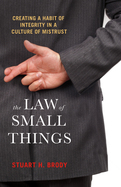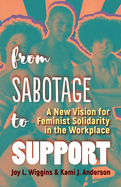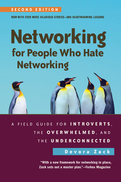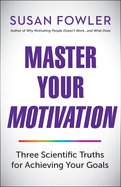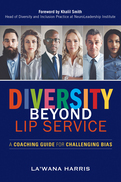Search Results: ""
Results 1021-1026 of 1358
We are living in a time when dishonesty and duplicity are common in our public institutions, our workplaces, and even in our personal relationships. But by recognizing and resisting the small, seemingly inconsequential ways we make moral compromises in our own lives, we can repair the tear in our social and moral fabric.
The Law of Small Things begins with an IQ (Integrity Quotient) test designed to reveal the casual way we regard our promises and the misconceptions we have about acting truthfully. The book shows how most people believe that integrity is something we “just have” and that we just do, like a Nike commercial. It depicts these and other deceptions we deploy to appear to act with integrity without actually doing so.
The Law of Small Things also exposes how our culture encourages breaches of integrity through an array of “permitted promise-breaking,” a language of clichés that equates self-interest with duty, and the “illusion of inconsequence” that excuses small breaches with the breezy confidence that we can fulfill integrity when it counts.
Brody challenges the prevailing notion that integrity is a possession you hold permanently. No one “has integrity” and no one is perfect in practicing it. What we have is the opportunity to uphold promises and fulfill duties in each situation that faces us, large and small. Integrity is a practice and a habit of keeping promises, the ones we make explicitly and the ones that are implied in all our relationships.
Ultimately, developing skill in the practice of integrity leads us to knowledge of who we are--not in the way the culture defines us, but in the way we truly know ourselves to be.
The Law of Small Things begins with an IQ (Integrity Quotient) test designed to reveal the casual way we regard our promises and the misconceptions we have about acting truthfully. The book shows how most people believe that integrity is something we “just have” and that we just do, like a Nike commercial. It depicts these and other deceptions we deploy to appear to act with integrity without actually doing so.
The Law of Small Things also exposes how our culture encourages breaches of integrity through an array of “permitted promise-breaking,” a language of clichés that equates self-interest with duty, and the “illusion of inconsequence” that excuses small breaches with the breezy confidence that we can fulfill integrity when it counts.
Brody challenges the prevailing notion that integrity is a possession you hold permanently. No one “has integrity” and no one is perfect in practicing it. What we have is the opportunity to uphold promises and fulfill duties in each situation that faces us, large and small. Integrity is a practice and a habit of keeping promises, the ones we make explicitly and the ones that are implied in all our relationships.
Ultimately, developing skill in the practice of integrity leads us to knowledge of who we are--not in the way the culture defines us, but in the way we truly know ourselves to be.
Dig Your Heels In
2019
Joan Kuhl helps women create a clear vision of what their career path deserves to be and make a convincing business case for equality to their managers and senior leadership. You'll learn strategies for overcoming sexist cultural attitudes about gender and leadership, as well as for dealing with self-limiting behaviors like Imposter's Syndrome (the feeling that you're never good enough despite a track record of success) and the Myth of Meritocracy (the idea that just doing good work is the only way to advance). Because relationships are absolutely crucial, Kuhl describes how to build support networks before you even need them and explains how to get actionable feedback that will help you get to the next level—the kind women rarely are afforded.
Case studies, practical exercises, and inspiring stories from Kuhl's work with clients at companies such as Eli Lilly and Company, Goldman Sachs, U.S. Soccer, BlackRock, South Carolina Asphalt Pavement Association and top business schools make this a truly comprehensive guide. It's an indispensable resource for women seeking to build the confidence and conviction to secure the seat at the table they've earned and create a welcoming workplace for everyone.
Case studies, practical exercises, and inspiring stories from Kuhl's work with clients at companies such as Eli Lilly and Company, Goldman Sachs, U.S. Soccer, BlackRock, South Carolina Asphalt Pavement Association and top business schools make this a truly comprehensive guide. It's an indispensable resource for women seeking to build the confidence and conviction to secure the seat at the table they've earned and create a welcoming workplace for everyone.
Women are acculturated within systems that encourage them to sabotage one another; this book shows how they can break free of this cultural programming and use whatever privilege and power they have to raise each other up.
Joy Wiggins and Kami Anderson advocate that the only way women can successfully support each other is by addressing the varying intersections of our individual power and privileges, particularly focusing on how some privileges are inherited along lines of race, class, sexuality, and geography. When we fully examine how we have power in certain situations and not in others, we start to see where we can lend privilege to create truly inclusive spaces for the historically underrepresented and marginalized.
Wiggins and Anderson look at how the dynamics of privilege and power have played out in the history of the feminist movement and identify and break down socialized behaviors and ideologies that trigger implicit bias and microaggressions. And they provide tools to interrupt negative thoughts and actions so women can nurture mutual support and show up as their authentic selves. Each chapter features a dialogue between them reflecting on how issues of race, privilege, and power have played out in their lives and their friendship.
The system of patriarchy has created an environment for women to knowingly and unknowingly sabotage each other—it is not inherent in women themselves. This book teaches us how to take an active approach to becoming better allies for each other and by so doing improve our world and end the cycle of injustice.
Joy Wiggins and Kami Anderson advocate that the only way women can successfully support each other is by addressing the varying intersections of our individual power and privileges, particularly focusing on how some privileges are inherited along lines of race, class, sexuality, and geography. When we fully examine how we have power in certain situations and not in others, we start to see where we can lend privilege to create truly inclusive spaces for the historically underrepresented and marginalized.
Wiggins and Anderson look at how the dynamics of privilege and power have played out in the history of the feminist movement and identify and break down socialized behaviors and ideologies that trigger implicit bias and microaggressions. And they provide tools to interrupt negative thoughts and actions so women can nurture mutual support and show up as their authentic selves. Each chapter features a dialogue between them reflecting on how issues of race, privilege, and power have played out in their lives and their friendship.
The system of patriarchy has created an environment for women to knowingly and unknowingly sabotage each other—it is not inherent in women themselves. This book teaches us how to take an active approach to becoming better allies for each other and by so doing improve our world and end the cycle of injustice.
Would you rather get a root canal than face a group of strangers? Does the phrase “working a room” make you want to retreat to yours? Devora Zack, an avowed introvert and successful consultant who gives presentations to thousands of people at dozens of events annually, feels your pain. She found that other networking books assume that to succeed, you have to act like an extrovert. Not at all. There is another way.
Zack politely examines and then smashes to tiny fragments the “dusty old rules” of standard networking advice. She shows how the very traits that make many people hate networking can be harnessed to forge an approach more effective and user-friendly than traditional techniques. This edition adds new material on applying networking principles in personal situations, handling interview questions, following up—what do you do with all those business cards?—and more.
Networking enables you to accomplish the goals that are most important to you. But you can't adopt a style that goes against who you are—and you don't have to. As Zack writes, “You do not succeed by denying your natural temperament; you succeed by working with your strengths.”
Zack politely examines and then smashes to tiny fragments the “dusty old rules” of standard networking advice. She shows how the very traits that make many people hate networking can be harnessed to forge an approach more effective and user-friendly than traditional techniques. This edition adds new material on applying networking principles in personal situations, handling interview questions, following up—what do you do with all those business cards?—and more.
Networking enables you to accomplish the goals that are most important to you. But you can't adopt a style that goes against who you are—and you don't have to. As Zack writes, “You do not succeed by denying your natural temperament; you succeed by working with your strengths.”
If you want to accomplish what's important to you, discipline and willpower won't get you where you need to go. In this iconoclastic new book, Susan Fowler reveals compelling insights and actions to help you master and maintain your motivation.
Motivation is at the heart of everything you do and everything you want to do but don't. Unfortunately, the ways we typically motivate ourselves don't work. Relying on sheer determination eventually becomes exhausting—it's not sustainable. And even setting goals can backfire—if you're not setting them for the right reasons.
Susan Fowler says motivation is energy, and what matters is the quality, not the quantity. Traditional “motivators” such as fear, guilt, or the promise of a reward provide low-quality, short-term energy. Drawing on the latest empirical research, she proves that high-quality, optimal motivation is a skill that you can learn and apply.
Science tells us that satisfying three basic needs—for choice, connection, and competence—is essential to optimal motivation. You need to feel like you've picked your path, not that you're being driven down it. Your goal should be linked to people or a purpose meaningful to you. And you want to continually learn and grow.
Through practical exercises and eye-opening stories, Fowler shows you how to identify and shift the quality of your motivation. The skill to master your motivation is important—it may be your greatest opportunity to evolve, grow in wisdom, and be the light the world so desperately needs.
Motivation is at the heart of everything you do and everything you want to do but don't. Unfortunately, the ways we typically motivate ourselves don't work. Relying on sheer determination eventually becomes exhausting—it's not sustainable. And even setting goals can backfire—if you're not setting them for the right reasons.
Susan Fowler says motivation is energy, and what matters is the quality, not the quantity. Traditional “motivators” such as fear, guilt, or the promise of a reward provide low-quality, short-term energy. Drawing on the latest empirical research, she proves that high-quality, optimal motivation is a skill that you can learn and apply.
Science tells us that satisfying three basic needs—for choice, connection, and competence—is essential to optimal motivation. You need to feel like you've picked your path, not that you're being driven down it. Your goal should be linked to people or a purpose meaningful to you. And you want to continually learn and grow.
Through practical exercises and eye-opening stories, Fowler shows you how to identify and shift the quality of your motivation. The skill to master your motivation is important—it may be your greatest opportunity to evolve, grow in wisdom, and be the light the world so desperately needs.
"La'Wana Harris has opened this coach's eyes to the power of coaching practices to create new paths for diversity and inclusion work—whether or not you are formally trained as a coach. Please read this book and help create workplaces with honest engagement and access for all."
—Marshall Goldsmith, Thinkers 50 #1 Executive Coach and two-time #1 Leadership Thinker in the world
The ugly truth about diversity is that some people worry they must give up their power for others to have a chance. La'Wana Harris's Inclusion Coaching method helps people realize that sharing power isn't the same as losing it.
The elephant in the room with diversity work is that people with privilege must use it to allow others equal access to power. This is often why diversity efforts falter—people believe in diversity until they feel that they have to give something up. How do we talk them through this shift?
La'Wana Harris introduces Inclusion Coaching, a new tool based on cutting-edge research that identifies the stages of preparation, implementation, and “self-work” necessary to help individuals, teams, and organizations build a sustainable culture of inclusion. Harris's six-stage COMMIT model—Commit to courageous action, Open your eyes and ears, Move beyond lip service, Make room for controversy and conflict, Invite new perspectives, and Tell the truth even when it hurts—provides a proven process for making people aware of their own conscious and unconscious biases and concrete steps to make inclusion an embedded reality.
Harris offers managers and diversity coaches new models to empower everyone from employees to CEOs to “do” inclusion and address deep-rooted biases that are often invisible. She addresses the growing need to challenge bias and build authentic cultures where everyone can feel a sense of belonging.
—Marshall Goldsmith, Thinkers 50 #1 Executive Coach and two-time #1 Leadership Thinker in the world
The ugly truth about diversity is that some people worry they must give up their power for others to have a chance. La'Wana Harris's Inclusion Coaching method helps people realize that sharing power isn't the same as losing it.
The elephant in the room with diversity work is that people with privilege must use it to allow others equal access to power. This is often why diversity efforts falter—people believe in diversity until they feel that they have to give something up. How do we talk them through this shift?
La'Wana Harris introduces Inclusion Coaching, a new tool based on cutting-edge research that identifies the stages of preparation, implementation, and “self-work” necessary to help individuals, teams, and organizations build a sustainable culture of inclusion. Harris's six-stage COMMIT model—Commit to courageous action, Open your eyes and ears, Move beyond lip service, Make room for controversy and conflict, Invite new perspectives, and Tell the truth even when it hurts—provides a proven process for making people aware of their own conscious and unconscious biases and concrete steps to make inclusion an embedded reality.
Harris offers managers and diversity coaches new models to empower everyone from employees to CEOs to “do” inclusion and address deep-rooted biases that are often invisible. She addresses the growing need to challenge bias and build authentic cultures where everyone can feel a sense of belonging.


